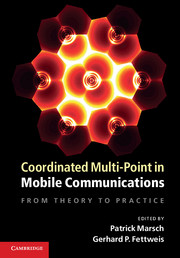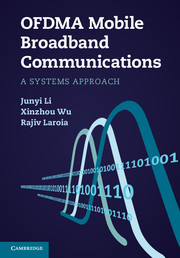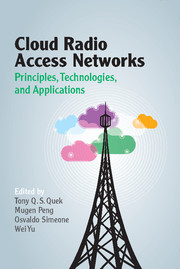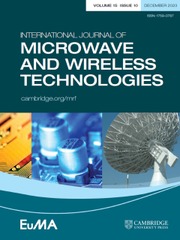Coordinated Multi-Point in Mobile Communications
A self-contained guide to coordinated multi-point (CoMP), this comprehensive book covers everything from theoretical basics to practical implementation. Addressing a wide range of topics, it highlights the potential gains of CoMP, the fundamental degrees of freedom involved and the key challenges of using CoMP in practice. The editors and contributors bring unique real-world experience from running the world's first and largest test beds for LTE-Advanced, and recent field trial results from these tests are presented. With detailed insight into the realistic potential of CoMP as a key technology for LTE-Advanced and beyond, this is a must-read resource for professionals and students who want the big picture on CoMP or require in-depth knowledge of how to build cellular communication systems for the future.
- Presents real performance data from the world's first LTE-Advanced test beds and the theoretical basics needed to understand it
- Covers the potential gains as well as the limits and trade-offs of CoMP
- Editors and contributors share their unique real-world insight into the practical potential of CoMP
Reviews & endorsements
'Interference is the limiting factor in cellular communications and smart coordination of transmission can lead to significant improvements in quality of service. This book provides a strong outline and lays out some of the fundamental assumptions and theoretical models to treat the subject and supports the theory with result from system-level test benches and field measurements. I recommend this book to everyone interested in the topic.' Siavash M. Alamouti, Vodafone Group R&D Director
'Coordinated Multi-Point in Mobile Communications is a must read for system engineers, students, and wireless [operators] in the important emerging area of CoMP. It is a comprehensive effort that balances the underlying theory with the practical guidelines in all aspects of the technology from theory to field test.' Gee Rittenhouse, Head of Research, Bell Labs
Product details
July 2011Hardback
9781107004115
508 pages
249 × 180 × 28 mm
1.13kg
158 b/w illus. 19 tables
Available
Table of Contents
- Part I. Motivation and Basics:
- 1. Introduction Patrick Marsch and Gerhard Fettweis
- 2. An operator's point of view Ralf Irmer
- 3. Information-theoretic basics Patrick Marsch and David Tse
- 4. Gains and trade-offs of multi-cell joint signal processing Patrick Marsch
- Part II. Practical CoMP Schemes:
- 5. CoMP schemes based on interference-aware transceivers or interference coordination Lars Thiele, Thomas Wirth, Malte Schellmann, Thomas Haustein, Volker Jungnickel, Philipp Frank, Andreas Müller, Heinz Droste, Chan-Byoung Chae, Ramya Bhagavatula, Doru Calin and Robert W. Heath, Jr
- 6. CoMP schemes based on multi-cell joint signal processing Chenyang Yang, Yafei Tian, Andreas F. Molisch, Xinning Wei, Tobias Weber, Lars Thiele, Thomas Haustein, Volker Jungnickel, Wolfgang Zirwas, Federico Boccardi, David Gesbert and Randa Zakhour
- Part III. Challenges Connected to CoMP:
- 7. Clustering Patrick Marsch, Stefan Brück, Andrea Garavaglia, Matthias Schulist, Ralf Weber and Armin Dekorsy
- 8. Synchronization D. Richard Brown III, Andrew G. Klein, Vincent Kotzsch, Gerhard Fettweis and Malte Schellmann
- 9. Channel knowledge Wolfgang Zirwas, Lars Thiele, Tobias Weber, Nico Palleit, Volker Jungnickel, Guido Dietl and Wolfgang Utschick
- 10. Efficient and robust algorithm implementation Jörg Holfeld, Gerhard Fettweis, Udo Wachsmann, Rainer Bachl and Stefan Müller-Weinfurtner
- 11. Scheduling, signaling and adaptive usage of CoMP Tarcisio Maciel, Ricardo B. dos Santos, Anja Klein, Christian Hoymann, Laetitia Falconetti, Michael Grieger, Patrick Marsch and Gerhard Fettweis
- 12. Backhaul I-Hsiang Wang, David Tse, Christian Hoymann, Laetitia Falconetti, Patrick Marsch, Thorsten Fahldieck and Mark Doll
- Part IV. Performance Assessment:
- 13. Field trial results Uwe Dötsch, Johannes Koppenborg, Patrick Marsch, Michael Grieger, Gerhard Fettweis, Volker Jungnickel, Andreas Forck, Stephan Jäckel, Sander Wahls, Lars Thiele, Thomas Haustein, Wolfgang Zirwas, Heinz Droste, Gerhard Kadel, Jörg Holfeld, Erik Fischer, Vincent Kotzsch and Hans-Peter Mayer
- 14. Performance prediction of CoMP in large cellular systems Thorsten Wild, Andreas Weber, Richard Fritzsche, Jens Voigt, Christian Schneider, Stefan Jäckel, Carsten Jandura, Laetitia Falconetti, Christian Hoymann, Andreas Müller, Philipp Frank, Jochen Giese, M. Awais Amin, Stefan Brück, Mark Doll, Lars Thiele and Michael Olbrich
- Part V. Outlook and Conclusions:
- 15. Outlook Armin Dammann, Christian Mensing, Stephan Sand, Peter Rost, Jens Voigt, Albrecht Fehske, Patrick Marsch and Gerhard Fettweis
- 16. Summary and conclusions Patrick Marsch and Gerhard Fettweis.







